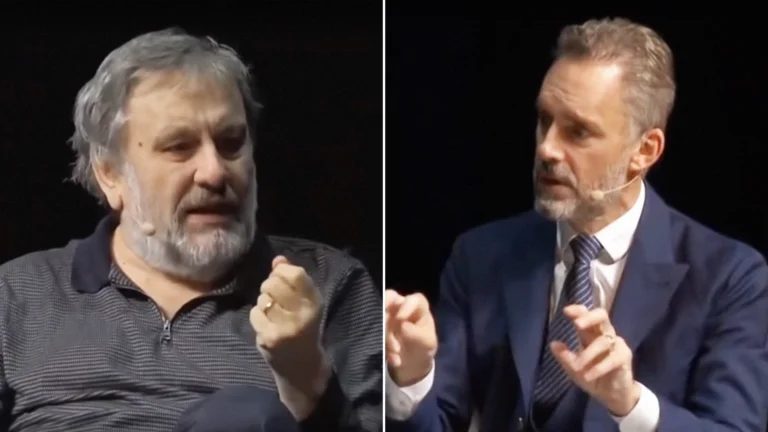The Slavoj Zizek vs Jordan Peterson debate took the world by storm, as two of the most influential thinkers of our time faced off on April 19, 2019. With millions of people tuning in from around the world, this discussion of happiness, capitalism, and Marxism became one of the most-watched philosophical debates in history. In this article, we will dive deep into the key moments, arguments, and outcomes of this intellectual clash, and explore the significance of the Zizek-Peterson debate for our modern society.

Setting the Stage: Who are Slavoj Zizek and Jordan Peterson?
To understand the magnitude of the Slavoj Zizek vs Jordan Peterson debate, it is essential to know the backgrounds of these two prominent intellectuals. Slavoj Zizek, a Slovenian philosopher and cultural critic, is known for his radical approach to social issues, drawing on a diverse array of influences including Marxism, psychoanalysis, and Hegelian philosophy. With a plethora of books and articles under his belt, Zizek has become a prominent figure in academia and popular culture alike.
On the other hand, Jordan Peterson is a Canadian clinical psychologist and professor of psychology, whose work focuses on cultural and religious issues, as well as the psychology of belief. Peterson gained fame with his book “12 Rules for Life: An Antidote to Chaos” and his opposition to compelled speech legislation in Canada. As a proponent of individualism and classical liberalism, Peterson often critiques postmodernism and Marxism.
The Debate's Main Theme: Happiness, Capitalism, and Marxism
The Slavoj Zizek vs Jordan Peterson debate centered on the theme “Happiness: Capitalism vs Marxism.” While the debate covered a wide range of topics, it ultimately revolved around the core question: Which economic and social system is better suited to bring about human happiness and well-being?
Peterson argued that capitalism, despite its flaws, has led to unprecedented levels of prosperity and well-being. He pointed to the rapid decline in global poverty and the increase in life expectancy as evidence of capitalism’s effectiveness. Peterson also criticized Marxism for its historical association with totalitarian regimes and the suffering they have caused.
In contrast, Zizek questioned the sustainability of capitalism, highlighting its tendency to create vast wealth inequality and environmental degradation. He advocated for a reevaluation of Marxism, suggesting that a more nuanced understanding of its principles could lead to a more equitable and just society.
Key Moments and Arguments
Throughout the Slavoj Zizek vs Jordan Peterson debate, both intellectuals presented compelling arguments that captivated the audience. Some key moments included:
- Peterson’s critique of the Communist Manifesto, in which he argued that the document oversimplified social issues and lacked practical solutions.
- Zizek’s defense of Marxism, emphasizing its potential to address inequality and environmental issues.
- The discussion of political correctness and identity politics, with both agreeing that these issues are divisive and undermine meaningful discourse.
The Aftermath: Outcomes and Impact
The Slavoj Zizek vs Jordan Peterson debate had far-reaching consequences. In the immediate aftermath, many observers hailed it as a victory for open discourse and intellectual exchange. The event showed that even two thinkers with vastly different perspectives could engage in a respectful and productive conversation.
In the long term, the debate sparked renewed interest in both Marxism and capitalism, as people sought to understand the nuances and implications of these opposing systems. The conversation also demonstrated the importance of engaging with ideas that challenge our own, fostering a more intellectually diverse and tolerant society.
What We Can Learn from the Slavoj Zizek vs Jordan Peterson Debate
There are several key takeaways from the Slavoj Zizek vs Jordan Peterson debate that can inform our understanding of contemporary philosophical and political discussions:
- The importance of intellectual diversity: The debate showcased the value of engaging with contrasting viewpoints and fostering a culture of open dialogue. By exposing ourselves to different perspectives, we can develop a more comprehensive understanding of complex issues.
- The need for nuance: Both Zizek and Peterson highlighted the need for nuance when discussing economic and social systems. Recognizing the strengths and weaknesses of both capitalism and Marxism can help pave the way for more effective solutions to global challenges.
- The power of respectful discourse: Despite their differences, Zizek and Peterson maintained a respectful tone throughout the debate, demonstrating that it is possible to have productive conversations even when we disagree.
Conclusion
The Slavoj Zizek vs Jordan Peterson debate was a groundbreaking event that captured the attention of millions of people around the world. As a clash between two intellectual titans, this conversation challenged our understanding of happiness, capitalism, and Marxism, and demonstrated the importance of open discourse in our increasingly polarized society.
By examining the key moments, arguments, and outcomes of the Zizek-Peterson debate, we can glean valuable insights that can help us navigate the complexities of our modern world. In the end, the debate serves as a powerful reminder of the importance of intellectual diversity, nuance, and respectful discourse in our quest for a more just and equitable society.
